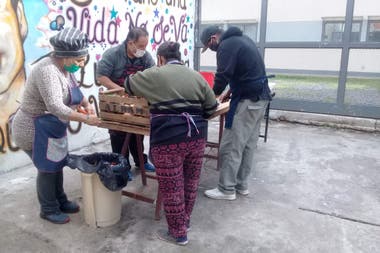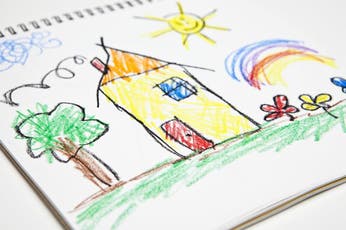A long and difficult path, where each one plays a key role and in which looking for culprits not only does not ease the journey, but makes it much more arduous. This is how the specialists describe part of what it means to go through, for a family that has
a member with an addiction
, the journey of recovery.
In full quarantine to prevent the spread of
COVID-19
and in a context where levels of uncertainty and stress skyrocketed, the impact on the most vulnerable groups – among them, the
people with addictions
– It was becoming evident during the last weeks.
What to do if, during isolation, we discover that a loved one has a problematic consumption?
What warning signs should we be aware of? How to accompany it? Those are some of the questions that are reproduced in thousands of homes in Argentina.
“There is no single family model and, therefore, there is no single way to accompany those who have an addiction,” says Gabriela Torres, head of the
Secretariat of Integral Policies on Drugs of the Nation (Sedronar)
and graduated in social work.
In all cases, what is never recommended is to load the inks on the addicted person or to designate them as “the black sheep”.
“It does not serve to blame her, to put her out of the family plot as if she were an alien and our relationships had nothing to do with it,” says the head of the Sedronar.
The key question is not what happens to you but what happens to us: it is a rethinking of roles where each member of the household is involved
Gabriela Torres, owner of Sedronar
To do this, you must disarm the idea that there is a culprit, since often that person is a symptom of something that happens in the family.
Talking about it and not hiding the situation should come first.
It is a delicate balance between giving someone space and not feeling alone. Torres maintains that the key question is not “what’s wrong with you” but “what’s wrong with us”:
it is a rethinking of roles where each member of the household is involved
.
Along these lines, Débora Blanca, a psychologist,
compulsive gambling specialist
and director of Ties in Play, considers that
The moment in which the family begins to recognize itself as part of the problem, not as an “impotent observer or witness”, is key.
“This recognition enables another way of bonding with the patient to promote their recovery,” says Blanca. And, coinciding with Torres, he points out that
We must break with categories that “always lead to places that do not allow us to move forward”: the victim and the culprit, the good and the bad.
According to the psychologist, it is “to think fallible, to understand that we can all be wrong and to make room for it.”
Addiction as a symptom
The referents consulted by LA NACION emphasize that, regardless of whether or not it involves the use of substances, addiction always appears as an escape valve, a “plug” that seeks to contain a conflict that the person cannot find a way to resolve. Not everyone develops an addiction, much less overnight.
In order for this to happen, a variety of factors intervene that make people more vulnerable, including genetic predisposition, basic pathologies and their family situation. The characteristic of an addiction is that it begins to take the whole life of the person, affecting family relationships, work, mental and physical health, among other issues.
For psychologists, quarantine can become a space for rediscovery and an opportunity to ask for therapeutic help.
“At a propitious moment so that those who are not under treatment can start it,” says Blanca. In that initial urge to ask for help, the family often plays a key role, as well as during the rest of the treatment. ”
There will always be more chances of recovery if it is included.
On the other hand, in all addictions there is an absence of the registration of the disease by the person who has it: they believe that they can solve it alone or control the problem.
Therefore, the first step is usually taken by family members.
“says the director of Lazos en Juego.
This is what happened to Maria. She is 43 years old and remembers that she reached Players Anonymous (JA) on April 15, 2016, defeated by the game. “I was absolutely destroyed in my dignity as a person. The game for me was an escape because the reality I lived in was unsustainable and I couldn’t find a way out,” he says. For her, the role of her sister was fundamental. “I remember that I was very angry to see the 0800 to ask for help in the casino bathroom, because I knew I had a problem but I did not want to admit it,” he says.
I was absolutely destroyed in my dignity as a person. My sister said to me: ‘you have a problem with the game’. It was the best they could have said to me.
Maria, Players Anonymous
Until one of her sisters was encouraged to confront her and made the first request for help. “He told me: ‘you have a problem with the game’. It was the best thing they could have said to me. If one cannot stop, this disease leads you to three paths: madness, prison or death. There is no other”, Maria assures.
Blanca talks about “co-addiction”, a concept that implies that, in families, everyone has a little responsibility regarding what happens. “There are different types of responsibility and that is something that must be retraced in the treatment. Sometimes for years, the family denies, does not want to realize, because if they recognize that there is a problem, they have to get to work with it. It is arduous and painful, but fundamental “, describes the psychologist.
For Pablo Rossi, director of
Manantiales Foundation
Realizing the addiction of a loved one almost always unleashes an alarm syndrome in the group, with anguish and concern, which are not always conveyed in the most convenient way.
Not panicking, getting busy and seeking specialized help is, for Rossi, essential.
Serenity allows you to avoid violent situations, useless discussions, condemnatory attitudes and humiliating accusations that further harm the already weak relationship.
The steps to follow
What if the person refuses to receive help?
What Blanca proposes is that the family member begin to have interviews with professionals on their own. “If the family gets to work on certain issues, it may happen that whoever has the addiction also decides to start,” says Blanca.
Loneliness and self-imposed isolation are often two characteristics that can deepen in those who have an addiction. “What you do not have to do is to tell him that he is alone. Threats such as ‘without stopping consuming, I’m leaving’, do not usually have good results,” says Torres.
For the owner of the Sedronar, family talks should not be interrogations, but listening spaces where the other is registered. Why should I ask for professional help? “Because many times it is easy for that conversation to end in blaming each other,” reflects Torres. “I like to convey to families that you have to speak from love and accompany.”
What are the symptoms to watch out for
? Torres summarizes them in one: when someone begins to lose the desire for life, when they are not interested in anything and stop doing things that they previously enjoyed, it can be a sign that there is a problematic consumption.
Some of the signs
-
Absences and reluctance
: Outside the context of quarantine, they usually occur with respect to activities that the person previously enjoyed, such as meetings, outings with friends or family events. It is also very common to break ties or new “friendships” appear. -
Emotional instability:
irritability, anger, sadness, reluctance, deconcentration, insomnia and change of sleep habits, anxiety, dullness. There is also an abandonment of the body and appearance. Many times they stop going to the doctor, the dentist, to do physical activity. -
Problems at work or school:
conflicts, low performance. There may be a drop out of studies. -
Contradictory stories:
the deceptions begin to become more visible. Lies, unexcused absences from home, change in your routine, strange behaviors, isolation.
Marizú Olivera Orquera, executive director
Al-anon
-A civil association that provides help and support to family or friends of people with alcoholism- maintains that recognizing that drinking a loved one bothers, angers or frustrates, and that it is a problem that affects the whole family, is not easy. In peer groups, containment is sought by sharing experiences, strengths and hopes with other family members who experience similar or similar situations. “Information about alcoholism is acquired, suggestions and literature are listened to and shared. We are learning to communicate with our loved ones in a calmer way,” he says.
Graciela F. has been a member for 10 years and 10 months of
Jug-anon
, a self-help group for family and friends of compulsive gamblers. He argues that, as a family, the challenges are enormous: having patience, accompanying, containing, not lowering your arms. “I came to the organization because of my husband, who had an addiction to horse racing. All of that remained in history and my house changed for the better,” she says, relieved.
However, he knows that “living with this disease is a devastating experience” and that “gambling addiction is not cured, it stops and you can recover, but it will always be, because there may be a relapse.”
For Graciela, although many couples, fathers, mothers, children and friends come to the meetings thinking that they are going for the player, they end up describing that they are going for themselves. “We are also sick: guilt and resentment, anguished, overwhelmed, distrustful, feeling betrayed. We have a lot of feelings that we do not understand and in the group’s stories we are crumbling,” he says. And he adds: “We work on ourselves: if in the house, for example, there are fights, we try not to get into those discussions and wait for the moment to speak when things calm down.”
Little by little, new habits are emerging, although there can always be relapses, both for the addicted person and for their circle of containment. ”
We know that starting to change ourselves there is a great possibility that the other will change
“summarizes Graciela.
ALSO
.
Publicado en el diario La Nación




